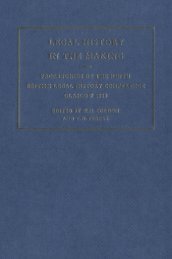130. - Collection Point® | The Total Digital Asset Management System
130. - Collection Point® | The Total Digital Asset Management System
130. - Collection Point® | The Total Digital Asset Management System
You also want an ePaper? Increase the reach of your titles
YUMPU automatically turns print PDFs into web optimized ePapers that Google loves.
4. Connections Between Sections ofZechariah 1-14 271<br />
whether he should fast (~in niphal) as he has done for many years, and<br />
receives the answer 'When you fasted, did you not fast for your own<br />
benefit; and do you not eat and drink for your own benefit ...' In the<br />
future Gaza's king will perish and Jerusalem's king will come;<br />
Yahweh, the one who makes (nfou) the storm clouds, will set<br />
Jerusalem's prisoners free; his people will be (not fasting: "inn, but) a<br />
crown (in).<br />
In fact this does not stand up to critical scrutiny. We have to discount<br />
most of the words in the list because their use is different: any<br />
connection between them would be too subtle for anyone we might<br />
imagine to be a normal hearer or reader. This excludes: "j^n, nbttf, "iT3,<br />
ntofl, ^DK, nntf, jitim, »3», aa 1 ?, "no, n»to, "IJJD, tfip, »bo, nV, rr-iKtf,<br />
mm, pin (probably), ID*, rua, "ofo, nnna, KIT, mr, mx, D'otf, fia, KT,<br />
am, -wzf, arm, mo, -jbn, tfpn, \wh.<br />
Some words might possibly be intentionally connected: ISO (but the<br />
passages are very different and there is not much else to link them),<br />
Dm (but the reference is different: human and divine compassion), |ra<br />
(8.12 and 10.1 only. Both refer to blessing but, in the first reference,<br />
the vine, ground and heavens give their increase; in the latter it is God<br />
who gives), *15 (but it can only serve to indicate the main focus of the<br />
contexts in which it occurs).<br />
D'fttf refers to relationships between people in 8.16 and 19, to safety<br />
for the people of Judah in 8.10 and 12, but to peace to the nations in<br />
9.10.<br />
Some words are used in similar ways but not distinctively enough to<br />
be effective in structuring: ipej, nofo.<br />
We have noted the distinctive phrase Dttfai "ODD previously. It<br />
occurs in a fairly prominent place in both 7.14 and 9.8, almost at the<br />
end of a sub-section of the text. In the first passage 1 its absence indicates<br />
the devastation of the pleasant land, in the second Yahweh himself<br />
stands as a guard so that no one (presumably no unauthorized<br />
person) can come and go as they please. <strong>The</strong> precise meaning, there-<br />
the table: it has been considered separately. I do not think that the individual parts of<br />
these names can be used for structuring purposes.<br />
1. Many commentators decline to explain the significance of this phrase.<br />
Rudolph translates 'ohne Verkehr' (Haggai, pp. 141-42); Perowne suggests 'as we<br />
say, went backward and forward'; presumably it signifies the everyday business of<br />
settled life, cf. Ps. 121.8, 701 -\tnKt -its}' nvr.






